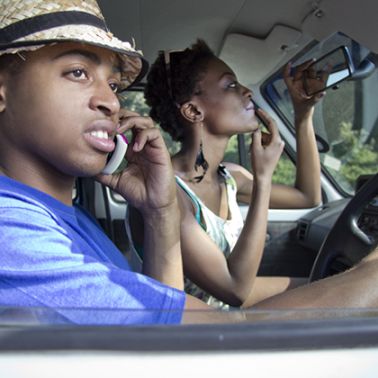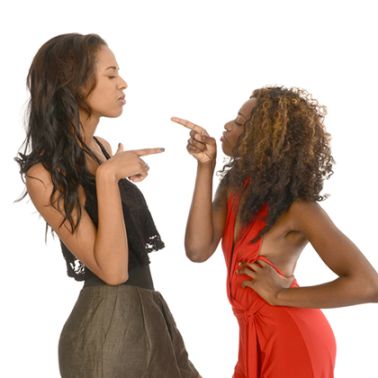The wrong ways to apologize
The Wrong Ways To Apologize - Page 3
Share the post
Share this link via
Or copy link

Gettyimages.com/Shot of a young couple having relationship problems at home
An apology is a powerful thing. Apologies have brought long-lost, estranged family members back together. Apologies have reunited childhood friends who were only separated by an age-old dispute that really doesn’t matter anymore. An apology can smooth over a lot. Meanwhile, failing to apologize can make the offense even worse. Usually, when you wrong someone (unless you did something truly unforgivable), they just want you to acknowledge you hurt them, to feel guilty, and to state all of that. Nobody is perfect. People make mistakes and other people get that. But when you aren’t willing to admit that you’ve messed up, then you put your pride in front of the feelings of others. It’s really silly when you think about it that way, right? That being said, not all apologies are created equal. How and when you apologize determine whether or not you’re forgiven. Here are the wrong ways to apologize.

Image Source: Shutterstock
Point out when they did the same thing
It doesn’t matter if this person once did the same thing to you. I mean…do we need to say it…two wrongs don’t make a right. All of the terrible things other people have done don’t justify you doing something bad. They don’t remove the pain you cause when you mess up.

Image Source: Shutterstock
Remind them of the good things you’ve done
You also can’t buy the right to do something wrong. It doesn’t matter how many times you babysat for this friend, gave that boyfriend a ride, or lent this person money: that doesn’t earn you the right to do something wrong.

Shutterstock
Blame alcohol
Love MadameNoire? Get more! Join the MadameNoire Newsletter
We care about your data. See our privacy policy.
“I was drunk” is not an excuse. You know why? Because, while you may not have had much control over your actions once you were drunk, you did have control over the decision to drink. One way or another, this is your fault and not the alcohol.

Shutterstock
Blame your bad day
If we all just started lashing out because we felt we deserved it because of our bad days then the world would be a horrifying place. Part of being a well-adjusted adult and good member of society is containing your pain and struggles to yourself rather than lashing out at others around you.

Image Source: Shutterstock
With a nasty tone
An apology doesn’t mean anything if you say it with attitude. People notice it if your words are “I’m sorry” but your tone is “Screw you.” The words aren’t enough. Tone is everything.

Shutterstock
Getting passive aggressive after
If you apologize, and then immediately start behaving passive aggressively towards the person, then you clearly didn’t mean the apology. And the person wouldn’t have wanted it if they knew it was just going to irritate you into more bad behavior.

Shutterstock
“Sorry you feel that way”
No. That’s not an apology. You apologize for your actions and not the other person’s feelings. Look: even if your intention wasn’t to hurt the person, if hurt them is what you wound up doing, you have to take responsibility. They didn’t hurt themselves, right?

Shutterstock
Calling the person sensitive
It doesn’t matter if they’re sensitive. Calling someone sensitive is just another way of avoiding responsibility. Again, apologizing isn’t about being correct. Maybe the person is too sensitive and other people wouldn’t have gotten upset with you. So what? If you care about this person, then just apologize and don’t call them sensitive.

Shutterstock
Making it out to be a smaller deal
Don’t try to downplay what you did. All the talking in the world won’t minimize the pain you caused the other person. You can’t get someone to rationalize away their feelings.

Shutterstock
Stating that someone else acts like that
So what if someone else acts like that? You’re not that person, and the person you’ve upset isn’t dealing with that person. Don’t decide how to behave based on how others do. Decide how to behave based on who you’ll be proud to be.

Corbis
Say they made you do it
This is textbook emotional abuse: “You made me do this because you x, y, z.” Nobody can make you do anything. You always have the power to control your reactions. Even if someone irritated you, that doesn’t mean they made you say or do something nasty.

Image Source: Shutterstock
Making them apologize too
Maybe everyone involved owes the other person an apology. Okay. So just make yours, but don’t say, “I’ll only apologize if you do.” Apologizing is about showing you care about someone. You don’t need them to apologize in order to do that.

Woman in therapy. Photo: Shutterstock
Blaming your trauma/past
Unfortunately, even if you’ve suffered some trauma that makes you act out, you still owe an apology. Nobody but you can heal you. It’s up to you to seek therapy, try meditation, or take steps to prevent that trauma from causing you to hurt others. If you caused pain (even if you did so out of your own pain), you owe an apology.

Image Source: Shutterstock
Saying you “Call it like it is”
This is such a cop-out. It doesn’t matter if the hurtful thing you said was true. What if we all just started saying everything that is true all of the time? The world would be chaos. Another part of being an adult is using a filter.

Shutterstock
Or doing it against your will
If you say, “I’m sorry” but then you say, “Okay??” or “Are you happy now?” or “Jeeeezzz” after…it doesn’t count. Sorry.







